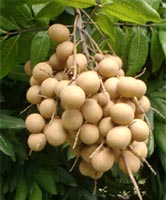The lychee, with its soft, milky-white flesh, juicy texture, and sweet flavor akin to honey, is a highly cherished tropical fruit. However, pregnant women in their 7th to 8th month should steer clear of this fruit.
 |
|
Lychee (Image: fruitlovers) |
According to ancient Chinese medicinal texts such as the “Shen Nong’s Herbal Classic” and “Compendium of Materia Medica,” lychee is known for its fragrant aroma and sweet taste, possessing warming properties. It is believed to nourish the heart and spleen, enhance energy, invigorate blood, and calm the mind. Additionally, it can generate body fluids, moisten the internal organs, making it a delicious and nutritious fruit. Due to its sweet and warming nature, lychee should be avoided by those with internal heat and phlegm, especially pregnant women.
During pregnancy, women often experience a deficiency of yin fire, resulting in symptoms of internal heat, which may include constipation, dark urine, a dry yellow tongue coating, a bitter mouth, and a sore throat. To mitigate this internal heat and nourish the blood for a calm pregnancy, consuming lychee may exacerbate these issues, leading to increased internal heat, potential bleeding, abdominal pain, or even miscarriage—particularly for women in their early to late months of pregnancy, who should strictly avoid lychee.
In traditional practices, some pregnant women drink lychee juice before giving birth, mainly those who are physically weak. The process of labor demands a significant amount of physical energy. For women who are physically weak, nearing the “postpartum period,” symptoms such as weakness in the limbs, dizziness, and excessive sweating may occur. Providing them with a bowl of warm lychee juice can be beneficial for boosting their strength and stabilizing their spirit, ultimately aiding in a smoother delivery. Of course, women with good physical health do not necessarily need to consume lychee juice.
For postpartum women, consuming lychee or drinking lychee juice is highly beneficial. If a new mother experiences symptoms such as dizziness, excessive sweating, and a pale tongue, it may indicate blood deficiency and energy depletion. In such cases, a warm porridge made with lychee, lotus seeds, red dates, and glutinous rice can effectively nourish energy and replenish blood. If light swelling occurs, drinking lychee juice can positively contribute to recovery, and it may be beneficial when combined with ginseng and steamed for consumption. Additionally, cooking chicken with a bit of lychee is also advantageous for those recuperating from weakness.

















































